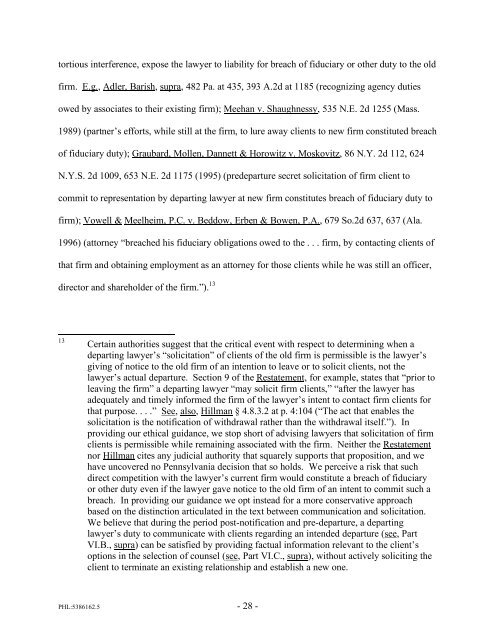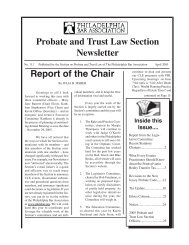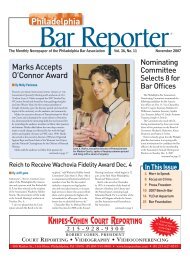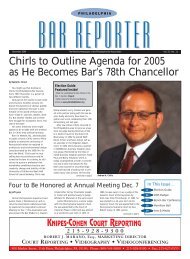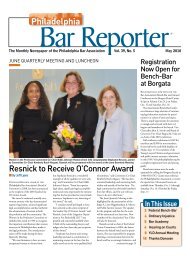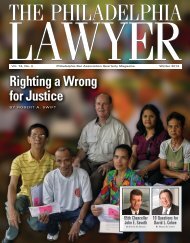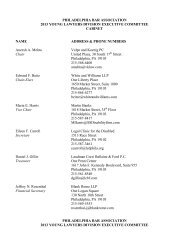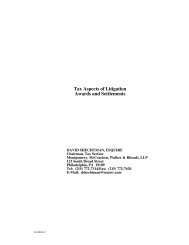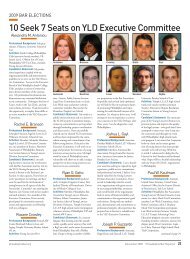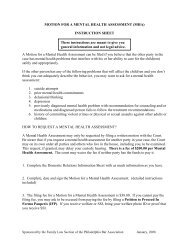here - Philadelphia Bar Association
here - Philadelphia Bar Association
here - Philadelphia Bar Association
Create successful ePaper yourself
Turn your PDF publications into a flip-book with our unique Google optimized e-Paper software.
tortious interference, expose the lawyer to liability for breach of fiduciary or other duty to the old<br />
firm. E.g., Adler, <strong>Bar</strong>ish, supra, 482 Pa. at 435, 393 A.2d at 1185 (recognizing agency duties<br />
owed by associates to their existing firm); Meehan v. Shaughnessy, 535 N.E. 2d 1255 (Mass.<br />
1989) (partner’s efforts, while still at the firm, to lure away clients to new firm constituted breach<br />
of fiduciary duty); Graubard, Mollen, Dannett & Horowitz v. Moskovitz, 86 N.Y. 2d 112, 624<br />
N.Y.S. 2d 1009, 653 N.E. 2d 1175 (1995) (predeparture secret solicitation of firm client to<br />
commit to representation by departing lawyer at new firm constitutes breach of fiduciary duty to<br />
firm); Vowell & Meelheim, P.C. v. Beddow, Erben & Bowen, P.A., 679 So.2d 637, 637 (Ala.<br />
1996) (attorney “breached his fiduciary obligations owed to the . . . firm, by contacting clients of<br />
that firm and obtaining employment as an attorney for those clients while he was still an officer,<br />
director and shareholder of the firm.”). 13<br />
13<br />
Certain authorities suggest that the critical event with respect to determining when a<br />
departing lawyer’s “solicitation” of clients of the old firm is permissible is the lawyer’s<br />
giving of notice to the old firm of an intention to leave or to solicit clients, not the<br />
lawyer’s actual departure. Section 9 of the Restatement, for example, states that “prior to<br />
leaving the firm” a departing lawyer “may solicit firm clients,” “after the lawyer has<br />
adequately and timely informed the firm of the lawyer’s intent to contact firm clients for<br />
that purpose. . . .” See, also, Hillman § 4.8.3.2 at p. 4:104 (“The act that enables the<br />
solicitation is the notification of withdrawal rather than the withdrawal itself.”). In<br />
providing our ethical guidance, we stop short of advising lawyers that solicitation of firm<br />
clients is permissible while remaining associated with the firm. Neither the Restatement<br />
nor Hillman cites any judicial authority that squarely supports that proposition, and we<br />
have uncovered no Pennsylvania decision that so holds. We perceive a risk that such<br />
direct competition with the lawyer’s current firm would constitute a breach of fiduciary<br />
or other duty even if the lawyer gave notice to the old firm of an intent to commit such a<br />
breach. In providing our guidance we opt instead for a more conservative approach<br />
based on the distinction articulated in the text between communication and solicitation.<br />
We believe that during the period post-notification and pre-departure, a departing<br />
lawyer’s duty to communicate with clients regarding an intended departure (see, Part<br />
VI.B., supra) can be satisfied by providing factual information relevant to the client’s<br />
options in the selection of counsel (see, Part VI.C., supra), without actively soliciting the<br />
client to terminate an existing relationship and establish a new one.<br />
PHL:5386162.5 - 28 -


